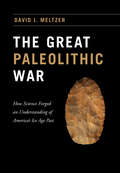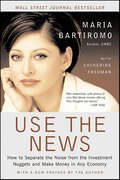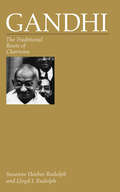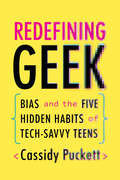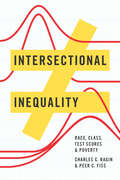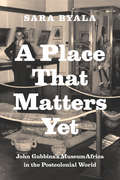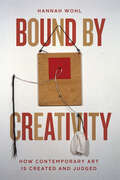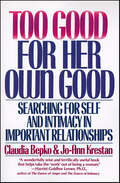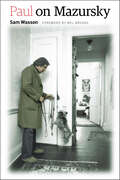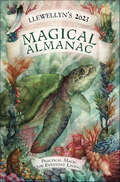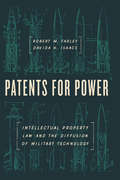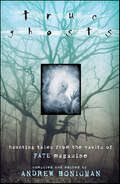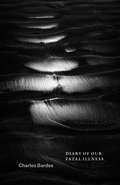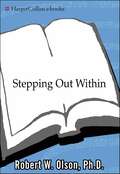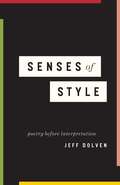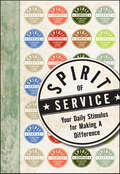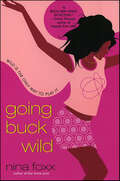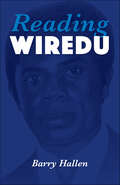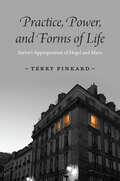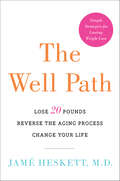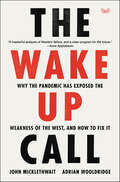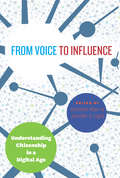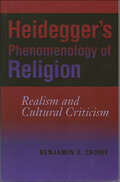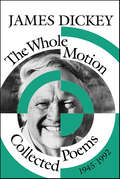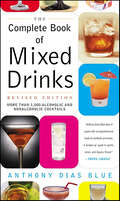- Table View
- List View
The Great Paleolithic War: How Science Forged an Understanding of America's Ice Age Past
by David J. MeltzerFollowing the discovery in Europe in the late 1850s that humanity had roots predating known history and reaching deep into the Pleistocene era, scientists wondered whether North American prehistory might be just as ancient. And why not? The geological strata seemed exactly analogous between America and Europe, which would lead one to believe that North American humanity ought to be as old as the European variety. This idea set off an eager race for evidence of the people who might have occupied North America during the Ice Age—a long, and, as it turned out, bitter and controversial search. In The Great Paleolithic War, David J. Meltzer tells the story of a scientific quest that set off one of the longest-running feuds in the history of American anthropology, one so vicious at times that anthropologists were deliberately frightened away from investigating potential sites. Through his book, we come to understand how and why this controversy developed and stubbornly persisted for as long as it did; and how, in the process, it revolutionized American archaeology.
Use the News: How to Separate the Noise from the Investment Nuggets and Make Money in Any Economy
by Maria Bartiromo Catherine FredmanExplaining the methods that have made her -- and her stock picks -- famous, Maria Bartiromo tells investors how to use hot information to make money in any market, raging bull or lumbering bear. Packed with sage advice from the most influential people on Wall Street, Use the News is an indispensable investment handbook that will disclose the Wall Street insiders' secrets and show you how to take control of your investments.
Gandhi: The Traditional Roots of Charisma
by Susanne Hoeber Rudolph Lloyd I. RudolphThe Rudolphs' analysis reveals that Gandhi's charisma was deeply rooted in the aspects of Indian tradition that he interpreted for his time. They key to his political influence was his ability to realize in both his daily life and his public actions, cultural ideals that many Indians honored but could not enact themselves—ideals such as the traditional Hindu belief that a person's capacity for self-control enhances his capacity to control his environment. Appealing to shared expectations and recognitions, Gandhi was able to revitalize tradition while simultaneously breaking with some of its entrenched values, practices, and interests. One result was a self-critical, ethical, and inclusive nationalist movement that eventually led to independence.
Redefining Geek: Bias and the Five Hidden Habits of Tech-Savvy Teens
by Cassidy PuckettA surprising and deeply researched look at how everyone can develop tech fluency by focusing on five easily developed learning habits.Picture a typical computer geek. Likely white, male, and someone you’d say has a “natural instinct” for technology. Yet, after six years teaching technology classes to first-generation, low-income middle school students in Oakland, California, Cassidy Puckett has seen firsthand that being good with technology is not something people are born with—it’s something they learn. In Redefining Geek, she overturns the stereotypes around the digitally savvy and identifies the habits that can help everyone cultivate their inner geek.Drawing on observations and interviews with a diverse group of students around the country, Puckett zeroes in on five technology learning habits that enable tech-savvy teens to learn new technologies: a willingness to try and fail, management of frustration and boredom, use of models, and the abilities to use design logic and identify efficiencies. In Redefining Geek, she shows how to measure and build these habits, and she demonstrates how many teens historically marginalized in STEM are already using these habits and would benefit from recognition for their talent, access to further learning opportunities, and support in career pathways. She argues that if we can develop, recognize, and reward these technological learning habits in all kids—especially girls and historically marginalized racial and ethnic groups—we can address many educational inequities and disparities in STEM.Revealing how being good with technology is not about natural ability but habit and persistence, Redefining Geek speaks to the ongoing conversation on equity in technology education and argues for a more inclusive technology learning experience for all students.
Intersectional Inequality: Race, Class, Test Scores, & Poverty
by Charles C. Ragin Peer C. FissFor over twenty-five years, Charles C. Ragin has developed Qualitative Comparative Analysis and related set-analytic techniques as a means of bridging qualitative and quantitative methods of research. Now, with Peer C. Fiss, Ragin uses these impressive new tools to unravel the varied conditions affecting life chances. Ragin and Fiss begin by taking up the controversy regarding the relative importance of test scores versus socioeconomic background on life chances, a debate that has raged since the 1994 publication of Richard Herrnstein and Charles Murray’s TheBell Curve. In contrast to prior work, Ragin and Fiss bring an intersectional approach to the evidence, analyzing the different ways that advantages and disadvantages combine in their impact on life chances. Moving beyond controversy and fixed policy positions, the authors propose sophisticated new methods of analysis to underscore the importance of attending to configurations of race, gender, family background, educational achievement, and related conditions when addressing social inequality in America today.
A Place That Matters Yet: John Gubbins's MuseumAfrica in the Postcolonial World
by Sara ByalaA Place That Matters Yet unearths the little-known story of Johannesburg’s MuseumAfrica, a South African history museum that embodies one of the most dynamic and fraught stories of colonialism and postcolonialism, its life spanning the eras before, during, and after apartheid. Sara Byala, in examining this story, sheds new light not only on racism and its institutionalization in South Africa but also on the problems facing any museum that is charged with navigating colonial history from a postcolonial perspective. Drawing on thirty years of personal letters and public writings by museum founder John Gubbins, Byala paints a picture of a uniquely progressive colonist, focusing on his philosophical notion of “three-dimensional thinking,” which aimed to transcend binaries and thus—quite explicitly—racism. Unfortunately, Gubbins died within weeks of the museum’s opening, and his hopes would go unrealized as the museum fell in line with emergent apartheid politics. Following the museum through this transformation and on to its 1994 reconfiguration as a post-apartheid institution, Byala showcases it as a rich—and problematic—archive of both material culture and the ideas that surround that culture, arguing for its continued importance in the establishment of a unified South Africa.
Bound by Creativity: How Contemporary Art Is Created and Judged
by Hannah WohlWhat is creativity? While our traditional view of creative work might lead us to think of artists as solitary visionaries, the creative process is profoundly influenced by social interactions even when artists work alone. Sociologist Hannah Wohl draws on more than one hundred interviews and two years of ethnographic research in the New York contemporary art market to develop a rich sociological perspective of creativity. From inside the studio, we see how artists experiment with new ideas and decide which works to abandon, destroy, put into storage, or exhibit. Wohl then transports readers into the art world, where we discover how artists’ understandings of their work are shaped through interactions in studio visits, galleries, international art fairs, and collectors’ homes. Bound by Creativity reveals how artists develop conceptions of their distinctive creative visions through experimentation and social interactions. Ultimately, we come to appreciate how judgment is integral to the creative process, both resulting in the creation of original works while also limiting an artist’s ability to break new ground. Exploring creativity through the lens of judgment sheds new light on the production of cultural objects, markets, and prestige.
Too Good For Her Own Good: Searching for Self and Intimacy in Important Relationships
by Claudia Bepko Jo-Ann KrestanIn the bestselling tradition of The Dance of Anger, a compassionate and insightful guide that shows women how they can learn to feel good about who they are and what they do.
Paul on Mazursky (Wesleyan Film)
by Sam WassonPaul Mazursky's nearly twenty films as writer/director represent Hollywood's most sustained comic expression of the 1970s and 1980s. But they have not been given their due, perhaps because Mazursky's films—both sincere and ridiculous, realistic and romantic—are pure emotion. This makes films like Bob & Carol & Ted & Alice, An Unmarried Woman, and Enemies, A Love Story difficult to classify, but that's what makes a human comedy human. In the first ever book-length examination of one of America's most important and least appreciated filmmakers, Sam Wasson sits down with Mazursky himself to talk about his movies and how he makes them. Going over Mazursky's oeuvre one film at a time, interviewer and interviewee delve into the director's life in and out of Hollywood, laughing, talking, and above all else, feeling—like Mazursky's people always do. The book includes a filmography and never-before-seen photos.
Llewellyn's 2023 Magical Almanac: Practical Magic for Everyday Living
by LlewellynBreathe new life into your magical practice with Llewellyn's 2023 Magical Almanac. For more than thirty years, this almanac has provided useful spells, rituals, and ideas that inspire all levels of practitioners to improve their connection to magical energies and elements.This year's edition features dozens of captivating articles, grouped by element, on coin magic, Afro-Caribbean Witchcraft, the magic of scent, nonverbal quarter calls, fire dance magic, nightmare protection, palm tree magic, sabbath guided meditation, and more. You'll also enjoy a fantastic coloring section with coloring pages, color correspondences, and two spells to be used with the coloring pages.
Patents for Power: Intellectual Property Law and the Diffusion of Military Technology
by Robert M. Farley Davida H. IsaacsIn an era when knowledge can travel with astonishing speed, the need for analysis of intellectual property (IP) law—and its focus on patents, trade secrets, trademarks, and issues of copyright—has never been greater. But as Robert M. Farley and Davida H. Isaacs stress in Patents for Power, we have long overlooked critical ties between IP law and one area of worldwide concern: military technology. This deft blend of case studies, theoretical analyses, and policy advice reveals the fundamental role of IP law in shaping how states create and transmit defense equipment and weaponry. The book probes two major issues: the effect of IP law on innovation itself and the effect of IP law on the international diffusion, or sharing, of technology. Discussing a range of inventions, from the AK-47 rifle to the B-29 Superfortress bomber to the MQ-1 Predator drone, the authors show how IP systems (or their lack) have impacted domestic and international relations across a number of countries, including the United States, Russia, China, and South Korea. The study finds, among other results, that while the open nature of the IP system may encourage industrial espionage like cyberwarfare, increased state uptake of IP law is helping to establish international standards for IP protection. This clear-eyed approach to law and national security is thus essential for anyone interested in history, political science, and legal studies.
True Ghosts: Haunting Tales from the Vaults of FATE Magazine
by Andrew HonigmanFrom the vaults of FATE Magazine come true stories of encounters with ghosts, phantoms, and haunted places. An elderly waitress silently serves breakfast to two friends at an eerily deserted diner—and the next day, the friends discover the diner is out of business and slated for demolition. A phantom train still blows its whistle more than fifty years after a gruesome accident. And a grandfather's spirit brings a warning that saves his family from a deadly house fire.Over the past sixty years, FATE magazine has published thousands of true ghost stories—personal accounts from ordinary people who have had extraordinary run-ins with the spirit world. This collection features the best of these spine-tingling, bizarre, heartwarming, and sometimes humorous haunting experiences. These frightening firsthand reports include tales of:Ghostly ApparitionsMessages from the DeadDream VisitationsNear-Death and Out-of-Body ExperiencesHaunted PlacesSpirits Helping the LivingVortexes, Time Slips, and Portals to Other DimensionsSpirit Guides and Angels
Diary of Our Fatal Illness (Phoenix Poets Ser.)
by Charles BardesThis moving prose poem tells the story of an aged man who suffers a prolonged and ultimately fatal illness. From initial diagnosis to remission to relapse to death, the experience is narrated by the man’s son, a practicing doctor. Charles Bardes, a physician and poet, draws on years of experience with patients and sickness to construct a narrative that links myth, diverse metamorphoses, and the modern mechanics of death. We stand with the doctors, the family, and, above all, a sick man and his disease as their voices are artfully crafted into a new and powerful language of illness.
Stepping Out Within: A Practical Guide to Relationships and Transformation
by Robert W. OlsenStepping Out Within has descriptive copy which is not yet available from the Publisher.
Senses of Style: Poetry before Interpretation
by Jeff DolvenIn an age of interpretation, style eludes criticism. Yet it does so much tacit work: telling time, telling us apart, telling us who we are. What does style have to do with form, history, meaning, our moment’s favored categories? What do we miss when we look right through it? Senses of Style essays an answer. An experiment in criticism, crossing four hundred years and composed of nearly four hundred brief, aphoristic remarks, it is a book of theory steeped in examples, drawn from the works and lives of two men: Sir Thomas Wyatt, poet and diplomat in the court of Henry VIII, and his admirer Frank O’Hara, the midcentury American poet, curator, and boulevardier. Starting with puzzle of why Wyatt’s work spoke so powerfully to O’Hara across the centuries, Jeff Dolven ultimately explains what we talk about when we talk about style, whether in the sixteenth century, the twentieth, or the twenty-first.
Spirit of Service: Your Daily Stimulus for Making a Difference
by HarperCollins PublishersInspired by President Obama’s call to national service, Spirit of Service is a daily devotional that will stir the soul and inspire every reader to meet the challenge of helping others with hope, energy, personal resources, and innovation. Offering 365 ways to serve, this self-help experience allows readers to look at all the ways that theycan get involved in service to others, from serving the person sitting next to them to their communities as a whole, from national service to actions that impact the world.
Going Buck Wild
by Nina FoxxLet's go crazy!Successful Claudia Barrett seems to be doing it all right. She's a vice president at her firm, with an engagement ring on her finger from the man who's loved her since high school. So what if she's been wearing it for five years -- and her classic, expensive, dull everyday outfits make her look like someone fatally allergic to a good time?What exactly is wrong with the girl?She's bored, for one thing. She's thirty years old and in a rut -- and best friend, Pam, thinks it's time Claudia got her freak on. It's time to inject a little action, adventure, and good old-fashioned lust into this sister's life. But practicing what Pam is preaching and going buck wild could have some serious consequences, especially when tall, dark, and dangerous Cody is added to the mix.
Reading Wiredu (World Philosophies)
by Barry HallenReading Wiredu is the first comprehensive overview of the philosophical thought of Kwasi Wiredu. Born in Ghana in 1931, Wiredu, an important observer and critic of philosophy generally, remains an original and penetrating African thinker. Interrelating Wiredu's philosophical writings from across decades, Barry Hallen sets forth the basic tenets and the defining features of his philosophy. Wiredu's thought is divided into five distinct but interconnected areas: his response to the philosophy of Quine on issues of logic and ontology, issues of language in philosophical reflection, the nature of truth as a practical and philosophical concern, the principle of sympathetic impartiality that all human beings must live by to survive as a group, and finally, consensus building as rooted in intentional, negotiated, and rational exchanges that are part of everyday life. Reading Wiredu explores the scope and depth of Wiredu's philosophical thought, which can be framed through what he calls a genetic methodology—a methodology that privileges environmental considerations in the production of various forms of thought. Hallen's overview is intended to assist scholars and students in grasping Wiredu's complex philosophical thought.
Practice, Power, and Forms of Life: Sartre’s Appropriation of Hegel and Marx
by Terry PinkardPhilosopher Terry Pinkard revisits Sartre’s later work, illuminating a pivotal stance in Sartre’s understanding of freedom and communal action. Jean-Paul Sartre’s Critique of Dialectical Reason, released to great fanfare in 1960, has since then receded in philosophical visibility. As Sartre’s reputation is now making a comeback, it is time for a reappraisal of his later work. In Practice, Power, and Forms of Life, philosopher Terry Pinkard interprets Sartre’s late work as a fundamental reworking of his earlier ideas, especially in terms of his understanding of the possibility of communal action as genuinely free, which the French philosopher had previously argued was impossible. Pinkard reveals how Sartre was drawn back to Hegel, a move that was itself incited by Sartre’s newfound interest in Marxism. Pinkard argues that Sartre constructed a novel position on freedom that has yet to be adequately taken up and analyzed within philosophy and political theory. Through Sartre, Pinkard advances an argument that contributes to the history of philosophy as well as key debates on action and freedom.
The Well Path: Lose 20 Pounds, Reverse the Aging Process, Change Your Life
by Jamé HeskettLose twenty pounds and reverse the aging process in just sixty days with this clinically proven, holistic lifestyle plan from an anti-aging expert whose clients include some of New York City’s most successful women.Most diets don’t work because they restrict food intake and put inconsistent physical stress on the body, starving cells, throwing hormones out of whack, and slowing down metabolism. In The Well Path, Dr. Jamé Heskett offers us a radical new approach: In order to lose weight, we first have to heal the damage we’ve done to our bodies from years of dieting. Before we can lose weight for good, we need to achieve homeostasis—total balance in the body, with all its systems working in concert. When you're there, you’re full of energy, look and feel younger, and lose weight effortlessly.The Well Path is her sixty-day plan to get you there. Dr. Heskett provides a detailed week-by-week and day-by-day calendar of small changes and challenges to get you on your own Well Path. You begin with Well Prep, a month-long period to get you acclimated to simple lifestyle changes. The second month is devoted to Well Practice, a roadmap to homeostasis that focuses on six areas of CHANGE:Circulation—improving the vascular system gets rid of stored fat and toxinsHunger—learning to identify real and false hunger to avoid overeatingActivity—non-exercise activity that can burn hundreds of extra caloriesNutrition—a diverse array of nutrients (especially fiber) to improve gut absorption and balance hormonesGeneral Health—the importance of sleep, sex, stress, and social interactionExercise—Dr. Heskell’s code for maximum fat-for-energy exercise conversionThe Well Path will take you from sickness to health, fat to fit, and old to young—in just sixty days.
The Wake-Up Call: Why the Pandemic Has Exposed the Weakness of the West, and How to Fix It
by John Micklethwait Adrian Wooldridge"[An] executive summary of modern political history studded with sweeping assertions and telling anecdotes." -- The New York Times Book Review"Thought-provoking." -- Kirkus Reviews“A shot in the arm...powerful.” -- The Financial Times"The Wake-Up Call, refreshingly concise and eminently readable, highlights how the modern crisis of governance compounded the challenges of the pandemic." -- Bloomberg"The Wake-Up Call argues that Covid-19 has exposed not just one president's shortcomings but a much more profound degeneration of governance dating back long before 2016...You will read no more interesting book on the political consequences of the pandemic than this." -- Niall Ferguson, author of Civilization: The West and the Rest NAMED ONE OF THE BEST BOOKS OF 2020 (BLOOMBERG)An urgent and informed look at the challenges America and world governments will face in a post Covid-19 world.The Covid-19 pandemic has revealed that governments matter again, that competent leadership is the difference between living and dying. A few governments proved adept at handling the crisis while many others failed. Are Western governments healthy and strong enough to keep their citizens safe from another virulent virus—and protect their economies from collapse? Is global leadership passing from the United States to Asia—and particularly China? The Wake-Up Call addresses these urgent questions. Journalists and longtime collaborators John Micklethwait and Adrian Wooldridge identify the problems Western leaders face, and outline a detailed plan to help them become more vigilant, better prepared, and responsive to disruptive future events. The problems that face us are enormous; as The Wake-Up Call makes clear, governments around the world must re-engineer the way they operate to successfully meet the challenges ahead.
From Voice to Influence: Understanding Citizenship in a Digital Age
by Jennifer S. Light Danielle Allen and Jennifer S. LightHow have online protests—like the recent outrage over the Komen Foundation’s decision to defund Planned Parenthood—changed the nature of political action? How do Facebook and other popular social media platforms shape the conversation around current political issues? The ways in which we gather information about current events and communicate it with others have been transformed by the rapid rise of digital media. The political is no longer confined to the institutional and electoral arenas, and that has profound implications for how we understand citizenship and political participation. With From Voice to Influence, Danielle Allen and Jennifer S. Light have brought together a stellar group of political and social theorists, social scientists, and media analysts to explore this transformation. Threading through the contributions is the notion of egalitarian participatory democracy, and among the topics discussed are immigration rights activism, the participatory potential of hip hop culture, and the porous boundary between public and private space on social media. The opportunities presented for political efficacy through digital media to people who otherwise might not be easily heard also raise a host of questions about how to define “good participation:” Does the ease with which one can now participate in online petitions or conversations about current events seduce some away from serious civic activities into “slacktivism?” Drawing on a diverse body of theory, from Hannah Arendt to Anthony Appiah, From Voice to Influence offers a range of distinctive visions for a political ethics to guide citizens in a digitally connected world.
Heidegger's Phenomenology of Religion: Realism and Cultural Criticism (Philosophy of Religion)
by Benjamin D. CroweThroughout his long and controversial career, Martin Heidegger developed a substantial contribution to the phenomenology of religion. In Heidegger's Phenomenology of Religion, Benjamin D. Crowe examines the key concepts and developmental phases that characterized Heidegger's work. Crowe shows that Heidegger's account of the meaning and structure of religious life belongs to his larger project of exposing and criticizing the fundamental assumptions of late modern culture. He reveals Heidegger as a realist through careful readings of his views on religious attitudes and activities. Crowe challenges interpretations of Heidegger's early efforts in the phenomenology of religion and later writings on religion, including discussions of Greek religion and Hölderlin's poetry. This book is sure to spark discussion and debate as Heidegger's work in religion and the philosophy of religion becomes increasingly important to scholars and beyond.
The Whole Motion: Collected Poems, 1945–1992 (Wesleyan Poetry Series)
by James DickeyFor over three decades, James Dickey has been one of the nation's most important poets and a prominent man of letters. The Whole Motion collects his poetic oeuvre into a single volume: 235 poems from his first book, Into the Stone (1960), to The Eagle's Mile (1990), along with previously uncollected poems and unpublished "apprentice" works.
The Complete Book of Mixed Drinks: Over 1,000 Alcoholic and Non-Alcoholic Cocktails (Drinking Guides)
by Anthony Dias BlueWith more than 100 new recipes for cocktails, mixed drinks, and nonalcoholic beverages, this revised edition of Anthony Dias Blue's classic guide fills us in on what we need to know:How to stock a bar, listing alcoholic and nonalcoholic beverages by probable frequency of use.Bar and cocktail definitions -- learn the difference between a julep and a smash, a toddy and a flip.Calorie charts, mixology tips, and illustrated descriptions of glasses.Organized by spirit, each chapter is introduced by an accessible and eloquent essay. Discover more than 1,000 recipes for cocktails, categorized by Classics, Creative Concoctions, Signature Drinks, and Tropical Drinks -- everything from the popular Martini and the Coco Loco to Trader Vic's West Indies Punch, a Midori Sour, and a Velvet Hammer.Whether entertaining, bartending, or simply relaxing with a favorite drink, this is the must-have bar book.
